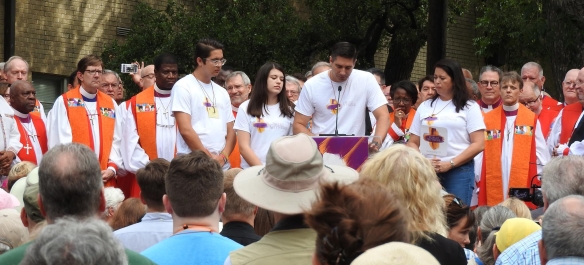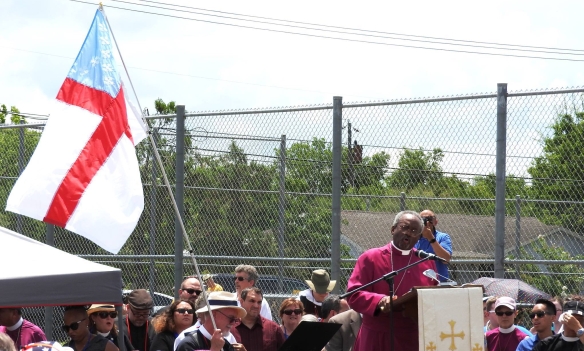I’ve been a deputy to General Convention three times – 2009, 2012, and 2015. For 2018, although I had been elected from Arizona, I later moved to Oklahoma and couldn’t serve as a deputy. Instead, I attended as a member of the Secretariat – which means my job was to sit up front (“on the platform”) at the House of Deputies and keep track of amendments as they were proposed.
This job gave me plenty of time to observe the flurry of activity – legislative, social, and mission-oriented – at General Convention. Although the basic structure of this Convention was the same as others I have attended, the atmosphere surrounding this Convention was very different. To describe what I mean, I give you my Top Ten Observations: General Convention 2018.

Leaders and musicians enjoy Revival! Photo credit: Episcopal Diocese of Oklahoma.
- Revival and Evangelism. Presiding Bishop Michael Curry’s first General Convention as PB was marked by a passionate desire to spread the good news about Jesus. From his fiery sermons, to the Saturday night revival (attended by many non-Episcopalians), to a special joint session on evangelism, to the legislative committee on Evangelism and Church Planting, which used part of its committee time to walk the streets of Austin, talk to people, and discover where God was at work there, there was truly an outpouring of the Holy Spirit. Staid Episcopalians acknowledged the ministry of evangelism as a core practice of the church, even if we are still somewhat hesitant about how to go about it. You can find many Episcopal Evangelism Resources here. Those resources include the Evangelism Charter for the church (here), which I helped write along with four other church-wide evangelism leaders. In the exhibit hall, I signed up to act as a “Jesus Genius” for two shifts, which meant I got to wander around the hall and ask people to tell me about their encounters with Jesus (a very inspiring thing to do!). A particularly transformative moment for me was acting as a prayer leader at the revival service. People were invited to come forward for prayer, and along with about 20 others, I prayed personally with people who responded to the invitation. Jesus was powerfully present in those prayers. Evangelism! Revival! Laying on hands and praying for people! It truly felt like a new day in our church.
- The Way of Love. Bishop Curry introduced us to the “Way of Love,” seven core practices that help us follow Jesus. You can find his introductory video and details of this initiative here. Bishop Curry invites us all to engage in these seven practices: Turn; Learn; Pray; Worship; Bless; Go; Rest (explained further in the downloadable brochure, here). Reawakening our church means making disciples, starting with the core spiritual practices of our faith. That’s what the Way of Love is all about.

Philip Schentrup speaks as his wife, April (right), and his two surviving children (left) look on. Photo credit: Episcopal Diocese of Oklahoma.
- Public Prayer and Witness.On Sunday, July 8, many attendees participated in two remarkable prayer events focused on Christian witness in the public square. At 9:30 that morning, Bishops Against Gun Violence led a public prayer service. It featured moving testimony from Philip and April Schentrup, whose daughter Carmen was a senior at Parkland High School and was president of her Episcopal youth group when she was murdered at school. Their tearful recollection of their ordeal, and the silent witness of Carmen’s younger brother and sister beside them, called us all to mindful attention and action to end a difficult and demanding crisis. Later that same day, I stood with over 1,000 other Episcopalians in the hot sun outside the Hutto Detention Center, a holding place for migrant women, many of whom had been separated from their children. The Center has been the subject of numerous allegations of physical and sexual abuse of detainees. The liturgy featured scripture readings, prayers, songs, and a sermon by Presiding Bishop Michael Curry. We learned later that the women in the center were deeply moved by the prayer service as they watched from inside the center and knew that they were not alone.

Presiding Bishop Curry speaks outside the Hutto Migrant Detention Center. Photo credit: Episcopal Diocese of Oklahoma.
- A Spirit of Gracious Compromise. Previous Conventions have featured win-or-lose politics, mostly focused around issues of human sexuality. In 2015, The Episcopal Church recognized same-sex marriages and authorized trial liturgies for blessing them. Yet eight dioceses in jurisdictions where same-sex marriage is legal still do not allow their priests to officiate at them. At this Convention, a small group of people worked quietly to create a compromise that would allow priests in those dioceses to perform same-sex marriages while still allowing the dissenting bishops to maintain their conscientious beliefs. The resulting compromise was Resolution B012, which calls for congregations to receive oversight from a bishop outside their diocese in marriage issues if their own bishop could not approve them. This compromise appeared to be a positive sign all around. One fervently hopes that all parties follow the intent and spirit of this resolution.
- Book of Common Prayer Revision. Again, the contentious debate about prayer book revision saw a spirit of gracious compromise. While many folks argued for revising the prayer book, many others opposed revision, seeing it as an opening to revise the core doctrine of the church. A generational divide appeared, with many younger people opposing a revision that would be led by elders. The compromise reached in an amendment proposed by Texas Bishop Andy Doyle was to “memorialize” the 1979 Book of Common Prayer while developing alternative liturgies. “Memorialize” is a novel term without a clear definition, but this model appears to follow the Church of England, whose 1662 Book of Common Prayer is still the official prayer book, but which has provided more modern liturgies in the volume called “Common Worship.” A new task force has been authorized to begin collecting alternative liturgies to propose to the next General Convention.
- Expansive Language Liturgies.One of the more common arguments advanced for prayer book revision was the heavily masculine language used for humans as well as God in the Rite II Book of Common Prayer. A group of priests proposed an expansive-language version of Rite II that used more inclusive terms, while still retaining traditional Trinitarian language and doctrine. (Full disclosure: I was one of the priests who had a small part in developing this proposal.) The resulting expansive-language Rite II, with Eucharistic Prayers A, B, and D, will be authorized for trial use beginning Jan. 1, 2019. Prayer C has been referred to the Standing Commission on Liturgy & Music for further work after rather singular discussions in both the committee and the House of Bishops, involving the Canadian Prayer Book and leisure suits.

Bishops read letters from Episcopalians detailing real-life experiences of abuse at the Liturgy of Listening, July 4. Photo credit: Episcopal Diocese of Oklahoma.
- #MeToo and #ChurchToo. The #MeToo movement reached the church, as many Episcopalians (mostly women clergy, but also male clergy and lay Episcopalians) have raised issues of sexual and other abuse in the church. The bishops responded with a powerful Listening Session on July 4, with prayers and public reading of letters detailing past abuses. The bishops agreed on a covenant about how they will respond to allegations of abuse. You can find Oklahoma Bishop Ed Konieczny’s statement about the bishops’ actions here. Meanwhile, in the House of Deputies, a 47-member commission proposed a number of resolutions to strengthen the church’s response to abuse allegations. Among the resolutions that passed both houses were the establishment of a Truth and Reconciliation Commission to explore discrimination against women and girls in the church; removal of gender and compensation information from Office of Transition Ministry portfolios; addition of family status, including pregnancy or child care, to the church’s nondiscrimination provisions; stronger whistleblower protection; a three-year (2019-21) suspension of the statute of limitations for reports of clergy sexual misconduct; and the creation of an anti-sexism training program that will be required of clergy and others.
- Racial Reconciliation. General Convention 2015 named racial reconciliation as one of the core priorities of our church, acknowledging that God loves all people equally and calls us to understanding, justice, and reconciliation in Jesus’ name. Since then, some initiatives have developed around this priority, including the “Becoming Beloved Community” resources found here. This Convention featured a special joint session with powerful speakers on racial reconciliation, but we also acknowledged how far we have to go, in the US and the other countries in which The Episcopal Church makes its home.
- Translations. Among the issues of racial reconciliation that came to the forefront at this Convention was the issue of translations. The Episcopal Church is located in 16 countries and has four official languages: English, Spanish, French, and Haitian Creole. Yet is has long been acknowledged that our Book of Common Prayer translations into Spanish and French are poorly done – they use antiquated idiom and are sometimes downright ungrammatical. To date, inadequate funding has been allocated to create dynamic translations, but $200,000 was allocated for this purpose at this Convention – a good start. In the meantime, controversy erupted because inadequate interpretation services were provided for some legislative committee hearings, leading to a protest led by Bishop Lloyd Allen of Honduras. Quick reactions by the General Convention Secretariat helped allay some of the immediate issues, but greater sensitivity to non-English dominant Episcopalians will be a big challenge for our increasingly diverse church in the future.
- Re-Admission of Cuba as a TEC Diocese. One of the most moving events at Convention happened as the Diocese of Cuba, which left The Episcopal Church in the 1960s after the Cuban Revolution, was formally re-admitted as a TEC diocese. The House of Bishops voted first, after a moving speech by Bishop Jose McLaughlin of Western North Carolina, and gave a standing ovation as Cuban Bishop Griselda Delgado Del Carpio was given seat and voice in the House of Bishops. The next day the House of Deputies voted, and again a standing ovation greeted Bishop Griselda and the Cuban deputies as they took their places in the House of Deputies. A joyful reunion of old friends and partners was a fitting high point for this Convention that had so many inspiring moments.








